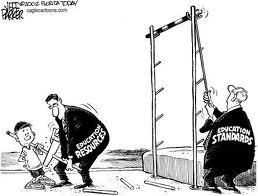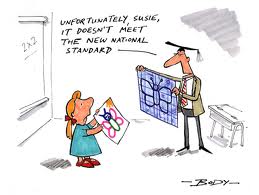Larry Cuban on School Reform and Classroom Practice: Why Common Core Standards Will Succeed
Even though there is little evidence that state standards have increased student academic achievement since the 1980s, the District of Columbia and 45 states have embraced the Common Core–(see here and here).
Even though there is little evidence that countries with national standards do not necessarily score higher on international tests than nations without national standards, many states have already aligned their standards to textbooks, lessons, and tests– (see here and here).
Even though there is little evidence Common Core standards will produce the skilled and knowledgeable graduates that employers and college teachers have demanded of public schools, most state and federal officials have assured parents and taxpayers that the new standards and tests will do exactly that–(see here and here).
Even though there is little evidence that state and national officials have resolved tough issues in the past when it came to curriculum standards (e.g., supplying professional development for teachers and principals, appropriate instructional materials, determining whether teachers altered their practices) much less reduce the inevitable problems that will occur in implementing the Common Core standards (e.g., resources for computer-based testing), cheerleaders continue to beat the drums for national standards–(see here and here)
With all of these “even though”s (and there are more), Common Core standards will succeed. How can that be?
The short answer is that evidence of success doesn’t matter much to those who make policy decisions. Oh sure, decision-makers have to mention evidence along with research studies and they do but not much when it comes to Common Core standards. Instead what they talk about are failing schools, the low-quality of teaching and how unless academic standards are raised–drum roll here at mention of Common Core–the economy will sink under the weight of graduates unprepared for an information-based workplace. Getting everyone to go to college, especially minority and poor students is somehow seen as a solution to economic, political, and social inequalities that have persistently plagued the U.S. for the past four decades
Reform-minded policy elites–top federal and state officials, business leaders, and their entourages with unlimited access to media (e.g., television, websites, print journalism)–use these talking points to engage the emotions and, of course, spotlight public schools as the reasons why the U.S. is not as globally competitive as it should be. By focusing on the Common Core, charter schools, and evaluating teachers on the basis of student test scores, these decision-makers have shifted public attention away from fiscal and tax policies and economic structures that not only deepen and sustain poverty in society but also reinforce privilege of the top two percent of wealthy Americans. Policy elites have banged away unrelentingly at public schools as the source of national woes for decades.
National, state, and local opinion-makers in the business of school reform know that what matters is not evidence, not research studies, not past experiences with similar reforms–what matters is the appearance of success. Success is 45 states adopting standards, national tests taken by millions of students, and public acceptance of Common Core. Projecting positive images (e.g., the film Waiting for Superman, “everyone goes to college”) and pushing myths (e.g., U.S schools are broken, schools are an arm of the economy) that is what counts in the theater of school reform.
Within a few years–say, by 2016, a presidential election year–policy elites will declare the new standards a “success” and, hold onto your hats, introduce more and better and standards and tests.
This happened before with minimum competency tests in the 1970s. By 1980, thirty-seven states had mandated these tests for grade-to-grade promotion and high school graduation. The Nation at Risk report (1983) judged these tests too easy since most students passed them. So goodbye to competency tests. That happened again in the 1990s with the launching of upgraded state curriculum standards (e.g., Massachusetts) and then NCLB and later Common Core came along. It is happening now and will happen again.
Policy elites see school reform as a form of theater. Blaming schools for serious national problems, saying the right emotionally-loaded words, and giving the appearance of doing mighty things to solve the “school” problem matter far more than hard evidence or past experiences with similar reforms.
This blog post has been shared by permission from the author.
Readers wishing to comment on the content are encouraged to do so via the link to the original post.
Find the original post here:
The views expressed by the blogger are not necessarily those of NEPC.


